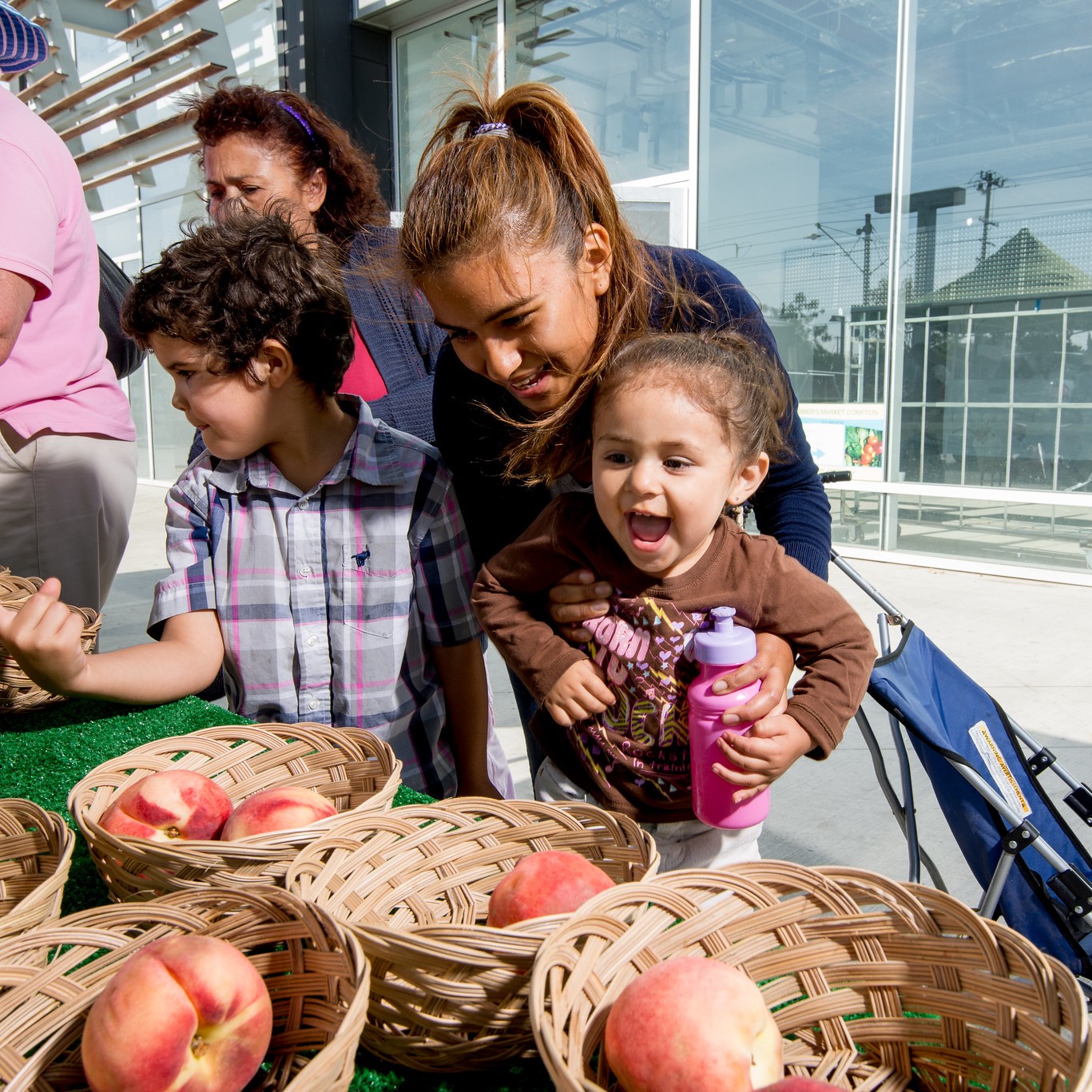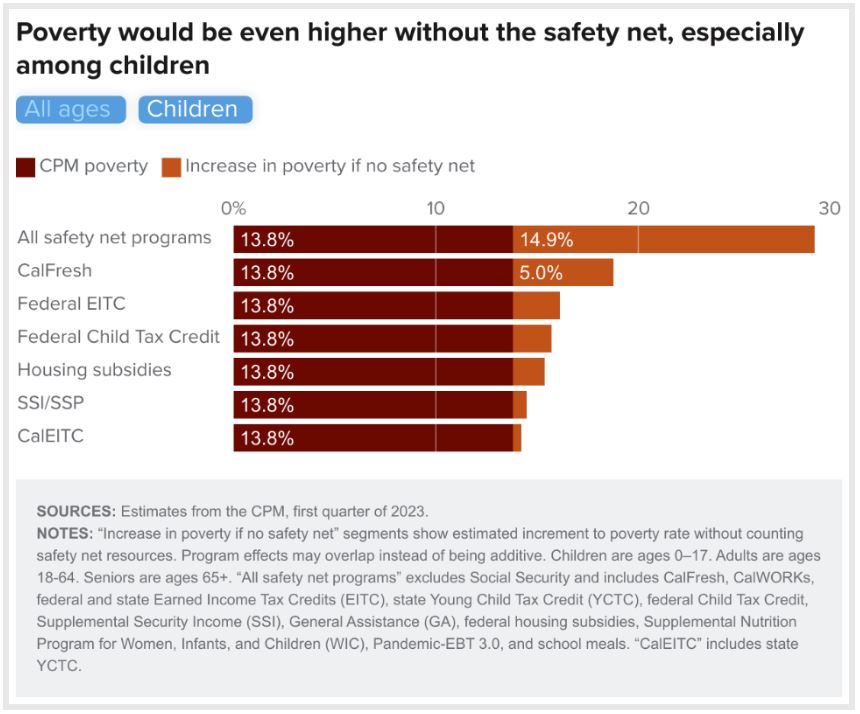 |
Erika Witt | First 5 LA Policy Analyst |
March 7, 2024
Children’s well-being is a multi-dimensional issue. To thrive, children need health care, nutrition, housing and child care. These basic needs are not isolated concerns but rather interconnected facets that are the cornerstones of optimal development, profoundly impacting children’s physical health, cognitive development, educational attainment and, in turn, long-term economic security. Policymakers must acknowledge the imperative to address childhood poverty through policies that directly support families’ ability to meet their basic needs.
Recent proposals at the state and federal levels offer promising opportunities to address childhood poverty and illustrate how policies have the potential to bring economic stability to more families. The U.S. House of Representatives recently reached a bipartisan agreement to reinstate the expanded child tax credit. This agreement incrementally raises the refund cap each tax year from 2023 to 2025, putting more money into families’ hands. According to the California Budget and Policy Center, after three consecutive years of reductions in child poverty levels, poverty rose by 166% among children ages 0 to 5 from 2021 to 2022. By allocating funds directly to families with young children, the adoption of the expanded child care credit would enhance their economic security and financial autonomy.
Strengthening social safety net programs is another powerful strategy for lifting children out of poverty. In the absence of existing safety net programs, an estimated 3.2 million more Californians (8.4%) would have lived in poverty in 2023; as most safety net programs prioritize children, this prevented approximately 1.3 million (14.9%) Californian children from falling into poverty. With child poverty on the rise again, we must look to policies that fortify the safety net and make it possible to lift children and families out of cycles of intergenerational poverty.
Though the last four years have brought unforeseen challenges to all family-serving systems, they also saw the development of innovative policies and practices that allowed families to stay afloat and, in some cases, fare better. Moreover, data shows that individuals participating in family-serving programs, including Temporary Assistance for Needy Families (TANF) and Child Care and Development Fund (CCDF), were also the most likely to receive benefits or participate in two or more additional safety net programs. Because of this interaction between programs, threats to one safety net program may, in effect, ultimately have a compounding effect on access to other programs by families and children with low income. As negotiations continue for funding essential family-serving programs at both the state and federal levels, we must acknowledge the way programs intersect and amplify the importance of the social safety net in helping families meet their basic needs.
One of the pivotal ongoing negotiations is the Special Supplemental Nutrition Program for Women, Infants, and Children (WIC), which supports pregnant, breastfeeding and non-breastfeeding postpartum women, infants and children up to age 5 with low incomes who are determined to be at nutritional risk. Historically, fully funding WIC has been a bipartisan priority. But if Congress fails to reach an agreement, WIC will face a $1 billion funding shortfall for the first time in twenty-five years. This will force states to create waitlists for nutritional assistance and turn away many new and expecting parents, disproportionately impacting Black and Latino families who are served by WIC.
In recent years, demand for WIC services has increased due to a higher number of new parents relying on the program as COVID-19-related nutritional benefits have expired and food costs have concurrently risen. In California alone, as many as 288,000 people will be turned away from this program if the estimated $7.2 to 7.3 billion of funding needed for this next fiscal year is not met.
Meanwhile, California’s 2024-25 budget proposal released in January also underscored the need to fortify state-level programs. The California Work Opportunity and Responsibility to Kids (CalWORKs) grants provide direct financial support to families, including many with young children. In 2023, the enacted state budget increased maximum aid levels to much more impactful levels. Now, proposed cuts to CalWORKs supportive services, such as family stabilization programs, threaten to slow this momentum in enhancing the social safety net. Specifically, the CalWORKs Family Stabilization Program (and other employment services programs) ensure that families get comprehensive supports when they are in crisis, improving the financial security and health of the individual, family, and children within the family. Reverting, reducing, or diverting funding meant to support families in their times of need would be a grave oversight.
Despite the potential funding cuts to these critical programs, the imperative to support children prenatal to age five has not been entirely forgotten. Earlier this month, the California Department of Health Care Services (DHCS) took a promising leap in bolstering an essential safety net program — issuing a call for public comment in support of a proposed CalAIM Section 1115 demonstration amendment, set to permit California to receive federal matching funds and provide continuous health care coverage to eligible children under age five who receive Medicaid (Medi-Cal) and the Children’s Health Insurance Program (CHIP).
In California, over half of our children are served by Medi-Cal, and over 70% of them are children of color. As we enter 2024 amidst fiscal constraints and the looming prospect of revenue deficits at the state level, proactively pursuing federal authorization for uninterrupted Medi-Cal coverage signifies a commitment to prioritizing the well-being of California’s youngest children, recognizing that interruptions in health care access deprive them of vital well-child visits, routine immunizations and crucial preventive care.
Addressing childhood poverty through a diverse range of policy solutions is critical for creating a more equitable California where every family can meet their basic needs. While childhood well-being is a complex issue, continuing to fund these programs while reducing barriers to access is a straightforward way that policymakers can ensure that every child prenatal to age 5 in Los Angeles County has the ability to meet their full developmental potential.









